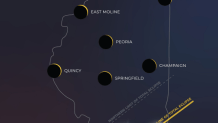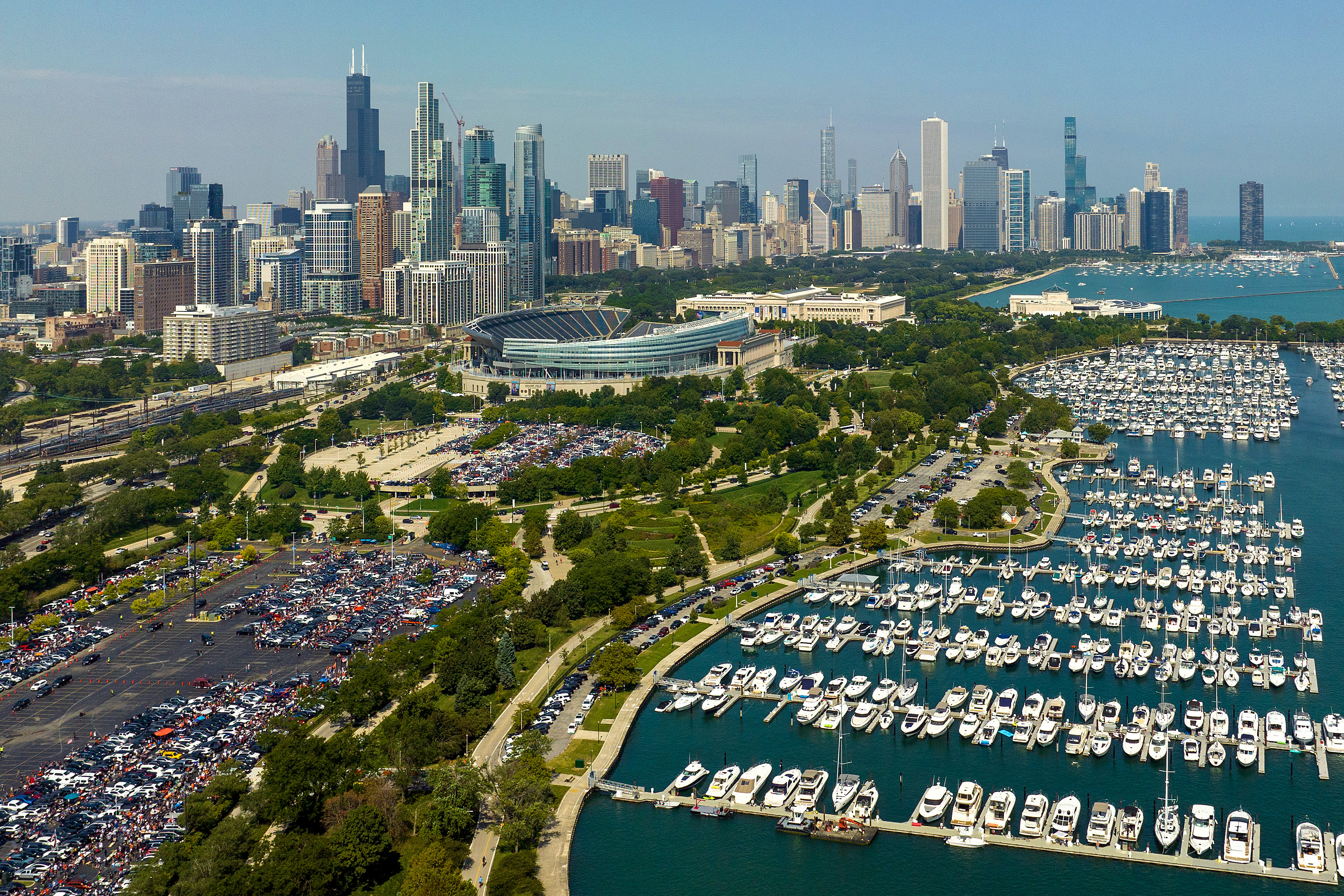You'll need special glasses in order to protect your eyes while watching the upcoming solar eclipse, but there's one big problem: counterfeit options are everywhere and detecting real vs. fake is no easy feat.
So how can you make sure the glasses you are buying are safe?
Experts say proper eyewear is critical during solar eclipses, maybe even moreso in the Chicago area since the region isn't in the path of totality.
"So a solar eclipse is no more dangerous to look at than just the regular sun," Michelle Nichols, director of public observing at the Adler Planetarium, told NBC Chicago. "You don't go out staring at the sun on any given day. You don't go out staring at a solar eclipse on any given day. The only people who can see the sun safely with just their eyes are the people who see totality - that is safe to look at. Any other view of the sun, you must have legit, noncounterfeit solar viewing glasses to be able to do it. This does not work with sunglasses or things like that."
Feeling out of the loop? We'll catch you up on the Chicago news you need to know. Sign up for the weekly Chicago Catch-Up newsletter here.
An article from Travel + Leisure magazine agrees, citing the American Astronomical Society.
"The American Astronomical Society recommends you wear solar eclipse glasses at all times while viewing a solar eclipse," the article said. "If you are not in the path of totality, you will only ever see the partial eclipse, so it's crucial you keep your eclipse sunglasses on at all times to avoid eye damage."
Here's what you should know before you buy your protective eyewear:
Local
What can happen if you don't have glasses while viewing a solar eclipse?
According to the Adler Planetarium, viewing the solar eclipse without glasses can result in irreversible eye damage within seconds, and as your eyes lack the nerve endings to register pain as it's occurring, it'll be too late by the time you know.
"The amount of light coming from the sun is intense," Nichols said. "And so you have a lot of visible light, you also have infrared light and ultraviolet light. It's the infrared and ultraviolet that you especially don't realize that your eyes are being subjected to. You don't have nerve endings on the back of your eyeball, so you could be experiencing a burn and not know it. And that burn might turn out to be permanent."
Those who are in the path of totality will be able to safely look at the eclipse only during the brief window where the sun is entirely covered.
How can you tell if your glasses are safe to use?
Nichols stressed the importance of ensuring that viewing glasses are not counterfeit, however, there's no real way to detect real glasses versus counterfeit ones just by looking at them.
"The glasses if they're counterfeit, they may appear fine, because maybe they're dark enough that you can that it appears like you can safely look at the sun. But what you don't know is are they letting through ultraviolet and infrared light. That's the thing that I would worry about the most," she said.
Detecting real vs. fake becomes even more challenging when companies tout unproven or inccurate safety claims.
"Just be careful and don't just assume just because it says safe glasses that that they actually are because anyone can write that," she said.
Experts suggest purchasing solar eclipse glasses through suppliers deemed "safe" by the American Astronomical Society.
The society's list offers links to "selected suppliers of solar viewers and filters that you can be confident are safe when used properly."
"These include companies and organizations with which members of the AAS Solar Eclipse Task Force have had good experience as well as other companies and organizations that have demonstrated to our satisfaction that the products they're selling meet the safety requirements of the ISO 12312-2 international standard," the list states.
The society notes, however, that its list is not exhaustive, and glasses not listed on the site could still be safe. They do not recommend using Amazon, eBay, Temu or other online marketplaces to find lowest-priced options.
"Before you buy a solar viewer or filter online, we recommend that you make sure that (1) the seller is identified on the site and (2) the seller is listed on this page," the society states.
According to Space.com, ISO-approved solar eclipse glasses must meet the following safety requirements:
- No more than 0.00032 percent of the sun's light may be transmitted through the filters.
- The filters must be free of any defects, such as scratches, bubbles and dents.
- Handheld viewers must be large enough to cover both eyes.
- Labels on the viewers (or packaging) must include the name of the manufacturer, instructions for safe use and warnings of the dangers of improper use.
What if you still have glasses from previous solar eclipses?
For those who still have glasses from the last solar eclipse, those could still be good. Nichols said they could still be usable.
"If folks have materials leftover from 2017, as long as those were legit and purchased from a legit vendor in 2017, you can just check it by shining a bright flashlight through it," she said. "Just make sure there's no pinholes or punctures or tears or rips or anything."
If you're not sure, Nichols said it's best to not risk it.
"When in doubt, throw it out. You don't want to take any chances with with your eyesight," she said.
What can you do if you don't have glasses?
Another option for people who don't have glasses is to create a pinhole image, Nichols said.
"There are indirect ways of seeing the eclipse," she said. "You can make a pinhole projector and what that means is take an index card, a piece of aluminum foil, something that you can stick a little hole into, line up that hole with the sun and project an image of this on down onto the ground. And that's a way to indirectly view an image of the eclipse."
Just don't look directly through the hole, she said, adding that "that would be putting a focused image of the sun on your eyeball and you don't want to do that."
What about viewing through your phone?
According to Nichols, using your phone to capture the solar eclipse could also be damaging.
"Don't just point your phone at the sun either because you'll fry your phone camera, so just don't do that either," she said.
She noted, however, that some companies make filters or covers for phone camera lenses to safely capture a solar eclipse.
NASA said viewers should not use solar glasses while trying to view the eclipse through a phone or camera lense.
"Do NOT look at the Sun through a camera lens, telescope, binoculars, or any other optical device while wearing eclipse glasses or using a handheld solar viewer — the concentrated solar rays will burn through the filter and cause serious eye injury," the agency said.
However, those who use a proper filter on their phone or camera lense should be able to safely view the eclipse through those devices.
"When viewing a partial or annular eclipse through cameras, binoculars, or telescopes equipped with proper solar filters, you do not need to wear eclipse glasses. (The solar filters do the same job as the eclipse glasses to protect your eyes)" NASA reported.
Who is in the path of totality?
While some parts of Illinois are in the coveted path of totality on April 8, meaning they will see the sun completely covered by the moon for several minutes, Chicago and its surrounding suburbs will still experience an estimated 94% totality. That number is higher than the eclipse in 2017 and even higher than any partial eclipses expected in the near future.
The path of totality includes the southern tip of Illinois, central and southern Indiana and Indianapolis. From there, it will race across Cleveland, Ohio; Buffalo, New York and into Maine.
The below map from the Adler Planetarium shows what the eclipse will look like in Illinois, with Carbondale, Mount Vernon, Metropolis and Mount Carmel among the southern Illinois cities in the path of totality.




